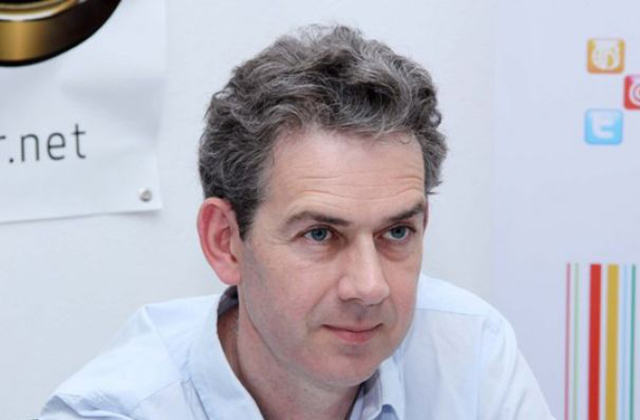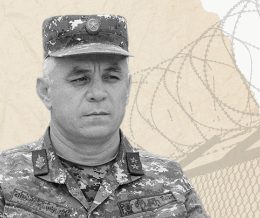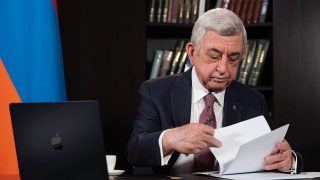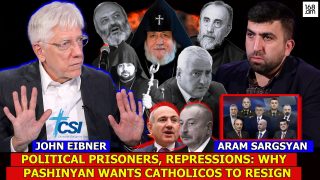
“Threat for a wide-scale war, different Russian interests, vacuum in NK settlement process”

Interview with Thomas de Waal, Senior Fellow Carnegie Europe, European analyst, British journalist.
Diplomatic activeness following the April War and the process of implementation of agreement anticipated from that activeness, and generally negotiations are at a deadlock, the situation on the contact line is rather tense, recently the Azerbaijani side launched another attack, new regional and extra-regional developments are observed. What developments are anticipated both on the contact line and in negotiations taking into consideration stances of the sides?
Many people are awaiting this spring in and around Nagorny Karabakh very nervously, as there has been no political progress since the fighting in April 2016 and there is no evidence that diplomacy is achieving any results. The fear stems from the fact that in both societies there is a mood of aggression which the leaders are not acting to dispel. In Azerbaijan levels of frustration are high as there has been no political progress on the Karabakh issue in the last year.
On the Armenian side, there is still anger and bitterness about last year’s violence. Neither Azerbaijani frustration nor Armenian anger are a policy or a strategy, but there is a danger that they could influence decisions and help trigger more conflict. We risk ending up in a “vicious circle” of aggression, which leads to real conflict and loss of life.
In your last article you mentioned that the conflict needs immediate diplomatic efforts to avoid new escalation and war on the conflict zone. How should negotiations be resumed, when agreements reached in Vienna and St. Petersburg remain on the paper?
The agreements achieved last summer should be the basis for negotiations. Indeed, they are the only basis for dialogue at the moment. Essentially, in the Vienna meeting, both sides agreed to compromises that they had previously rejected. In other words, the Azerbaijani side agreed to measures on strengthening the ceasefire regime and the Armenian side agreed to “comprehensive negotiations” on a peace agreement.
Why there is no progress?
It is no wonder that there is so much aggression in the air when diplomacy is seen to have achieved so little. A vacuum has been created which will be filled either by negotiations or by threats and potential military action. Another problem is that the other two Minsk Group co-chairs, France and the United States, have been seen to be too passive recently and that therefore the impression is created that Russia—and in particular foreign minister Sergei Lavrov—is the sole negotiator. Yet Russia is not fully trusted by either the Armenian or Azerbaijani side. Everyone, including Russia, needs to see Paris and Washington be more active and diplomatic activity needs to be choreographed by all three co-chairs.
After the meeting with President of Armenia Serzh Sargsyan, Francois Hollande proposed to “develop a mechanism that will enable to carry out monitoring and prevention. Sanctions are also possible in case of actions against peace.” How do you assess the productivity and possibility of this suggestion when even monitoring mechanisms are hard to implement on the contact line?
The issue of establishing mechanisms to better monitor the ceasefire has been discussed for many years. Former Russian president Dmitry Medvedev believed he had set up such a mechanism at a meeting in 2010 with the two presidents in Astrakhan. There was an official call for both sides to remove snipers from the Line of Contact at the Vilnius Summit of 2011. In the last year an agreement was made in principle to increase the size of Ambassador Kasprzyk’s monitoring mission. But nothing has changed. Ultimately, this is because a relatively weak ceasefire regime gives Azerbaijan—the side that lost the conflict of the 1990s—leverage and pressure it can use against the Armenians. It is unrealistic to expect that Baku will give up that leverage without getting something in exchange, such as an Armenian commitment to more substantial political negotiations.
What role and interest does Moscow have under current state of affairs? On account of high distrust toward Moscow both in Yerevan and Baku, to which extent will Moscow succeed to urge its programs to the parties to the conflict?
Russia is in a strange position vis-à-vis the Karabakh conflict, being the most influential outside power, the main mediator and also an interested party, which sells weapons to both sides and thereby fuels the conflict. There are also different Russian interests. I would say that the Russian security establishment and military has an interest in preserving the status quo and preserving the balance of power between Armenia and Azerbaijan. Others, such as the business elites and foreign minister Sergei Lavrov, see opportunities in resolving the conflict, believing that a peace settlement can be constructed which increases Russia’s influence in the region and opens up communication networks.
But I think the chief paradox of the “Russia factor” is that Moscow is increasing the likelihood of conflict by selling weapons to both sides, and yet has no interest in a new conflict. That would mean being under great pressure to abandon its balanced approach, honour its military alliance with Armenia and lose its relationship with Azerbaijan. In short, Russia has too many interests to be able to promote a resolution of the conflict on its own. Other international players must be involved.
Turkish President Recep Tayyip Erdogan said at a joint press conference with Russian President Vladimir Putin that creating the tripartite union of Turkey, Russia and Azerbaijan, as well as the settlement of the Nagorno-Karabakh conflict were discussed in the sixth meeting of the High-Level Russian-Turkish Cooperation Council. How will this new format impact on the situation in the contact line and on negotiations?
Turkey and Azerbaijan both want an enhanced Turkish role in the Karabakh conflict. But that is impossible so long as it is not a neutral actor–Turkey has no diplomatic relations with Armenia and expresses strong support for Azerbaijan’s position. No new formats will change that. And the warming of relations between Moscow and Ankara cannot overcome centuries-old differences on the politics of the Black Sea and the Middle East. It is hard for Russia and Turkey to agree a common position on the Karabakh conflict. Thomas de Waal Senior Fellow Carnegie Europe
By Araks Martirosyan






















